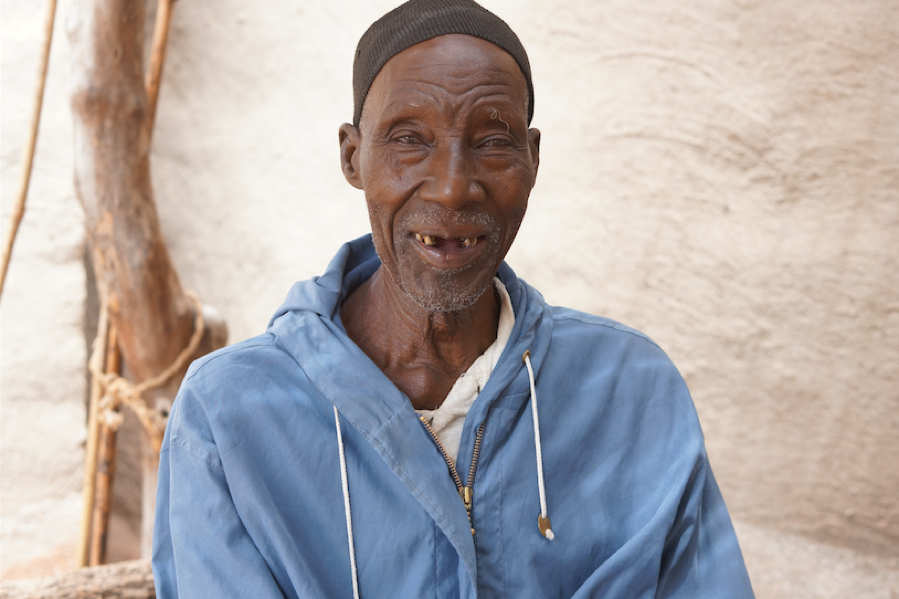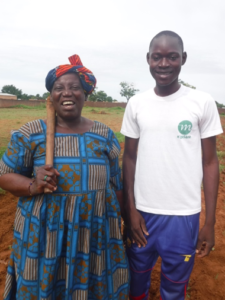It’s a national affair – Getting high-quality seeds and fertilizer in the hands of the smallholder farmers
By 2025, myAgro will work with 1 million farmers in 4 to 5 countries. To guarantee myAgro can continue to deliver high-quality inputs and services, myAgro invests in building an ecosystem of seed and fertilizer suppliers that are often located in the same country as myAgro’s farmers.

Mamadou, a farmer in his late seventies, who lives in the village of Faraba, southern Mali, has been planting all his life, but it was only since he joined myAgro in 2016, that he started to see farming as a profitable business.
His family traditionally has been planting maize, cotton, peanut and millet. In the past, he would use a combination of his own seeds and seeds from a cooperative nearby, but the seed quality was not great. Without a particular planting method and inconsistent use of fertilizer, he used to get low yields during harvest, just enough to feed his family.
As Mamadou’s story illustrates, input producers in Senegal and Mali often lack the professional infrastructure to meet the market’s demand for high-quality certified seeds. They lack the professional agricultural tools and knowledge for effective land preparation and development, which results in poor quality seeds and lower seed harvests.
While governments and research institutes have worked with the existing cooperatives, the focus has been on developing improved varieties rather than on commercializing new seed varieties and improving the production. Because of this missing link, cooperatives remain small and the quality they produce is inconsistent. As a result, cooperatives’ customers go without quality seeds and remained trapped in a cycle of low yields and low income each season.
Cheikh, a farmer in Koungheul, Senegal says: “Through the seed cooperative near my village I was able to access subsidized seeds. but the amount available can run out and the seed quality can vary,” he adds. This year, despite having access to subsidized seeds, Cheikh decided to enroll with myAgro instead.
myAgro addresses the lack of access to quality inputs by working closely with seed and fertilizer companies in Mali and Senegal, who benefit from having a guaranteed and direct customer base. These partners have been able to upgrade and professionalize their operations through our strict and thorough quality control measurements.
This year, myAgro will deliver seeds and fertilizer to 70,000 farmers in Senegal, Mali and Tanzania. Thanks to the combination of these high-quality inputs, on time delivery and agricultural trainings, myAgro farmers see their harvest and income increase by 50-100%
In 2018, thanks to myAgro’s input packages and services, myAgro farmers produced a total of 1,600 tonnes of food, which helped to feed 200,000 family members. In addition to seeds and fertilizer for dryland cereals, vegetables, and horticulture crops, myAgro has also offered add-on products such as solar lamps, insecticides and precision planters. By going from 240 farmers in 2011, to 70,000 farmers in 2019, myAgro has created a significant client base for seed and fertilizer cooperatives and companies, creating a clear incentive for input suppliers to work with myAgro.
myAgro’s growing client base helps to set the terms. Sedab is an input supplier in Senegal and has been working with myAgro since 2015. They deliver fertilizer and maize and rice seeds. “We appreciate how myAgro requires samples and conducts compliance testing at laboratories of their choice and requires the manufacturer’s certificate,” Lansana, Sedab’s Finance Manager explains.
A second way myAgro builds the ecosystem, is by working with (inter)national research institutions. Based on recommendations from IER and ICRISAT in Mali and ISRA in Senegal, myAgro introduces new, climate-resistant and nutritious products to its portfolio. In Mali for example, myAgro designed and commercialized a farm package specific to the needs of 5,000 smallholder sorghum farmers.
 Fatoumata is one of those myAgro sorghum farmers in the Sikasso region in Mali. This year she enrolled for a ¼ sorghum package. Thanks to myAgro’s inputs and trainings, she harvested 6 100KG bags instead of 3 bags she harvested last year using seeds and fertilizer from a supplier nearby.
Fatoumata is one of those myAgro sorghum farmers in the Sikasso region in Mali. This year she enrolled for a ¼ sorghum package. Thanks to myAgro’s inputs and trainings, she harvested 6 100KG bags instead of 3 bags she harvested last year using seeds and fertilizer from a supplier nearby.
Fatoumata in particular appreciates the nutritional benefits sorghum has for her family. “myAgro taught us about the various
benefits of the sorghum through the nutritional training such as the sorghum porridge,” she explains. “These are the main reasons why I am motivated to enroll again next year,” she adds.
For M’famara (pictured above), farmer and a father of twelve living in Mali, his motivation to enroll for sorghum was climate driven. With the unpredictable weather patterns of late, he needs a crop he can rely on during times of drought. “Whenever there’s a drought, the village is struck with famine, so we’re forced to buy food with all of the revenue that we’ve saved,” he explains. “That makes the poverty in the village even worse.”
Fortunately, a good sorghum harvest can help prevent those difficulties. “Sorghum is resistant to climate change. With a good sorghum harvest, I can meet my family’s needs during a drought,” Diallo says.
By getting the right quality inputs in the hands of smallholder farmers, farmers will be able to diversify their farms, have better harvests, double their income, and feed their families, all while becoming more resilient against the effects of climate change. That’s a real ecosystem change!